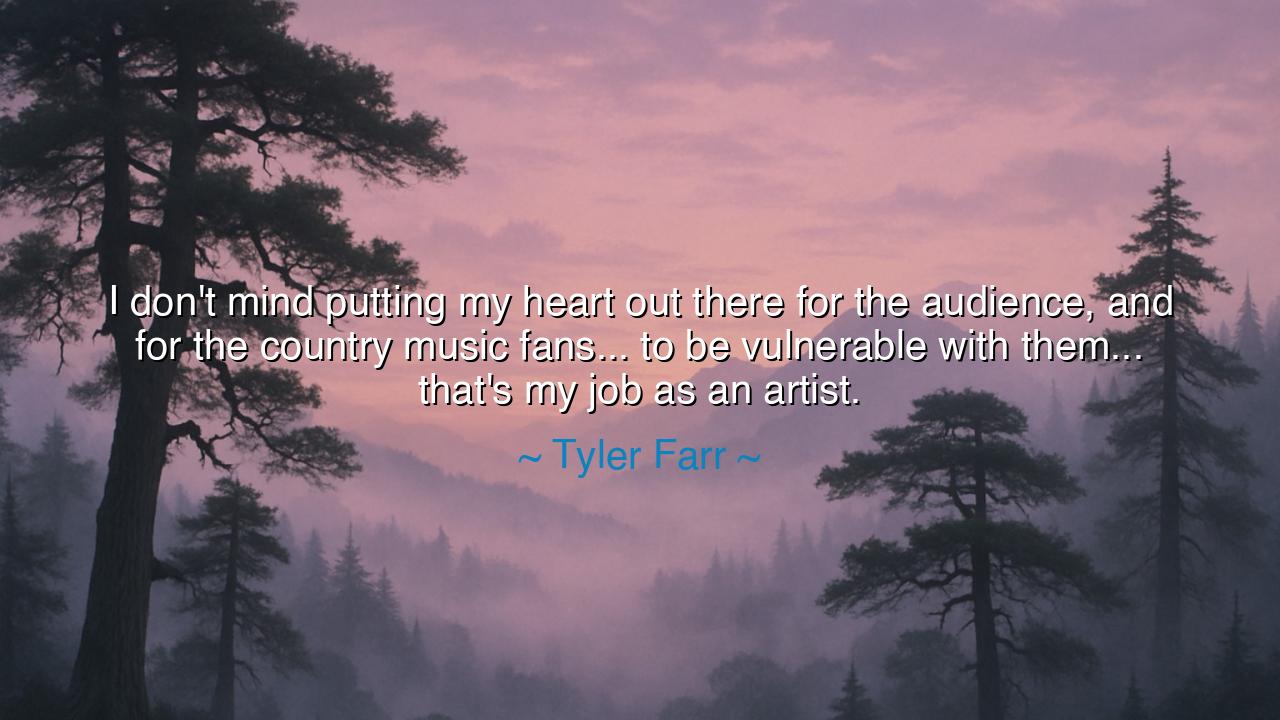
I don't mind putting my heart out there for the audience, and
I don't mind putting my heart out there for the audience, and for the country music fans... to be vulnerable with them... that's my job as an artist.






Hear now the words of Tyler Farr, a modern minstrel, whose confession carries the weight of timeless truth: “I don’t mind putting my heart out there for the audience, and for the country music fans… to be vulnerable with them… that’s my job as an artist.” These words shine like fire in the darkness, for they speak of the sacred duty of the artist, the one who dares to uncover the soul and place it trembling before others. In an age where many wear masks of stone, the artist becomes a vessel of vulnerability, reminding all that strength is not the absence of feeling, but the courage to reveal it.
To put one’s heart out there is to risk. It is to walk unarmored into the battlefield of human judgment, knowing that applause and scorn alike may fall upon you. Yet Farr speaks without hesitation, for he knows that this is the essence of his calling. The audience, those who gather not only to be entertained but to be moved, deserve nothing less than truth. And truth is never clothed in perfection—it is raw, wounded, trembling, and alive. In this offering of self, the artist becomes a mirror for every soul who listens.
The ancients understood this duty well. The poets of Greece, like Sappho, poured their own longings and sorrows into verse, unashamed of their fragility. The psalmists of old Israel sang not only of triumph, but of despair, doubt, and fear. And in every age, those who dared to expose their weakness became strong, for their words struck chords in the hearts of all who heard them. Farr’s words echo this lineage: to be an artist is not to pretend, but to unveil, to tear down the veil of pride so that others may recognize themselves in your song.
Consider also the story of Johnny Cash. He stood before prisoners in Folsom Prison, not with polished grandeur, but with songs of sorrow, sin, and redemption. He sang as one of them, baring his heart, speaking to their wounds as though they were his own. And in that moment of vulnerability, he was not diminished—he was magnified. His voice gave dignity to the broken, and his courage turned pain into communion. Farr’s words draw from this same well: the job of the artist is not to stand above, but to stand alongside, offering his heart as a bridge.
The lesson here is radiant: vulnerability is not weakness, but power. When we speak only from strength, we distance ourselves from others. But when we reveal our fears, our wounds, our hopes, we draw others closer. The audience does not crave perfection—they crave connection. They do not remember the flawless note as much as the heartfelt one. In this way, art becomes more than performance; it becomes a covenant between soul and soul.
Practical wisdom follows: you need not be a singer to live this truth. In your own life, dare to be open with those around you. Share your struggles, your hopes, your dreams, without fear of judgment. For in that openness, you grant others the freedom to be open as well. Speak honestly, act sincerely, and let your humanity shine unguarded. This is how you honor not only yourself, but the community around you.
Thus let Farr’s words be carved upon your heart: “I don’t mind putting my heart out there for the audience, and for the country music fans… to be vulnerable with them… that’s my job as an artist.” Carry this teaching forward, for whether you wield a guitar, a pen, or simply your daily voice, your task is the same: to be honest, to be brave, and to be vulnerable. In this, you not only fulfill your own calling, but awaken the hearts of all who walk beside you.






AAdministratorAdministrator
Welcome, honored guests. Please leave a comment, we will respond soon